It is a Friday night in late September at the Peppimenarti Social Club and a significant chunk of the adult population has converged to collectively knock the froth off a few cans after a long week.
Open for three hours, three days a week, and serving only mid-strength, the social club attracts visitors from as far away as the much larger community of Wadeye about an hour-and-a-half west in the otherwise dry region.
Differences are put aside and all comers are on their best behaviour in what could be seen as a model for the responsible consumption of alcohol in broader society, both Indigenous and non-Indigenous.
As if on queue at exactly 7pm, mosquitoes flood the beer garden in what seems like their millions, but the revellers are not deterred, getting in their final orders before last drinks are called at 7.30pm and everyone wanders home.
But scratch beneath the surface and the deep enmities between warring families that have been gradually tearing this town of only about 130 people apart for the past several years come bubbling into view.
As the beer flows, one group sits apart from most of the others — which are largely made up of members of the extended Wilson family, Peppimenarti’s formally recognised Traditional Owners — and among the isolated group is a man whose nickname has become synonymous with the notorious gang copping most of the blame for the unrest.
Anthony Thomas – AKA Jovi.
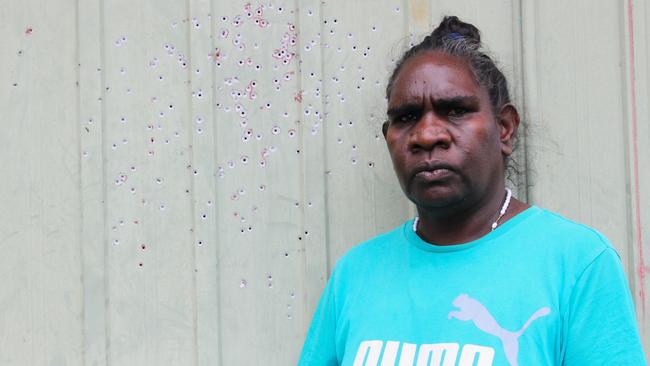
The following day, Mr Thomas is relaxing at home and declines to be interviewed, but his former partner Clara Kundu shares his — and by extension, the Jovi Boys’ — origin story.
“Because my old man calls himself like Bon Jovi … that’s why they call themselves Jovi Boys,” she says.
“He went for concerts at Melbourne, he’s seen (the band) in real life.”
“Every white (person) … they don’t call him Anthony, they call him Jovi because he went to the big (concert), Bon Jovi, at Melbourne, I can’t remember when was that.”

As she speaks, Ms Kundu gestures to a spray of holes in the side of Mr Thomas’s house, which she claims were the work of members of the rival families.
“We was over there at the brick house at my sister’s place and they came rushing with a lot of armed gang, and we know who the shooter was, when they shot all this wall, it was a shotgun,” she says.
She also takes the NT News on a tour of another house, now abandoned, in the part of town known as The Village where more holes trace the path of a rifle shot passing clear through the building while, she says, children were inside at the time.
“They were sleeping and they didn’t know they came in firing shots until they heard a big bang, boom, everybody was frightened,” she says.
“The only safe place for us was to go in the brick house, this one is not safe for us.”
At first, Ms Kundu and other members of her family — who also claim TO status — deny the Jovi Boys are instigators of the violence plaguing Peppimenarti.
But she later admits the tactical Territory Response Group recently made several arrests after the unrest made headlines earlier that month.
“They were looking for (some young men) because they stole a car … from Darwin,” she says.
“They came to my house and they was asking for my Jovi Boys.
“The TRG mob grabbed them in a rough way, knocked them on the ground, that’s why we’re quiet now.
“They’re all in prison, we only got the little ones now.”
But Ms Kundu says if the young men are allowed to return to Peppi, the family has a plan to take them out bush to try to get them to mend their ways.

Regina Pilawuk Wilson doesn’t claim to be a Traditional Owner of Peppimenarti but says her children are, due to the bloodline of her late husband, Harold Wilson, who founded the town as a cattle station in the early 1970s.
“I come from Wudikapildyerr,” she says.
“Me and my husband got married in Darwin and came out and started Peppimenarti, all my life I lived at Peppi with my children and (grandchildren).”
Ms Wilson and the rest of her family deny having anything to do with any shootings, saying claims any of the trouble comes from their end of town are “not true”.

“It’s not people from here, I raise my grandchildren in a good manner,” she says.
“It’s been going on and on and on and it’s getting worse, them Jovi Boys go to Darwin and steal people’s cars, which is wrong, no respect.”
She says her family members have repeatedly been the target of violence from the Jovi Boys, including one of her 17 grandchildren whose leg remains in a cast after he was run over by a car earlier in September, while the younger ones have been pulled out of school.
“He was walking back from his house where he lives to my house and this motor car was speeding towards my house and they bumped him, that was really scary,” she says.
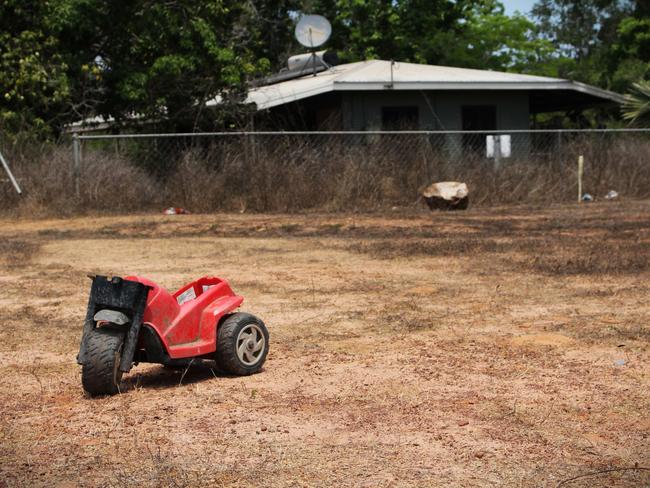
“One afternoon (my grandchildren) came out from the school and they chased them with machetes and rocks and they were screaming and running back and we saw them Village boys chasing my grandchildren, that’s why I said enough is enough.”
Ms Wilson also admits members of her own flock can stray at times but says it takes strong leadership from Elders to make sure the issues don’t fester and explode into full blown anarchy.
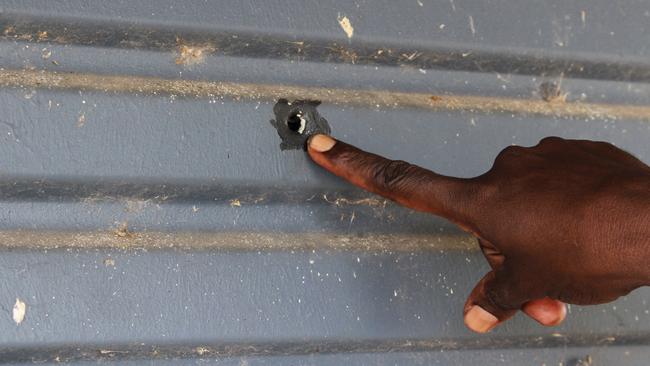
“My step-grandson, I raised him from one year old, he got mixed up with them other boys from outside, from Palumpa,” she says.
“They broke into the shop and the club and I banned him for seven years not to come back to the community and he only came back last year.”
Ms Wilson agrees with Ms Kundu that similar banning orders and taking young troublemakers out bush is one possible solution to the current problems but she’s not confident the other families are up to the task after “the way they’re treating us”.
“They should have bush camps and discipline them in the bush,” she says.
“The Elders from that side, they should run it, not us, I’m not helping anymore.
“It’s up to them to wake up and help themselves and talk to their kids and their sons and daughters.”
Ms Wilson is the chairwoman of Durrmu Arts and she and rival family matriarch Margaret Kundu are both acclaimed artists who once shared top billing at exhibitions around the world but today, centre manager Kara Rodski says those days are long gone.
“I came in 2019 and luckily I met some of the artists that now we don’t talk to because it’s too hard,” she says.

“Because Regina’s the chairwoman, she’s our main artist — we don’t want to pick sides, but if Regina’s here, no one from that end (of town) will come, which is also really sad.
“I tried dropping off some canvasses and paint and I told the artists if they drop it off at the shop then we can take it to art fairs and try and sell it for them but that didn’t really work.”
Ms Rodski says when she first came to Peppi, it was “a happy place” where “everyone got along” but she has since had to move away again because “it’s just not safe”.
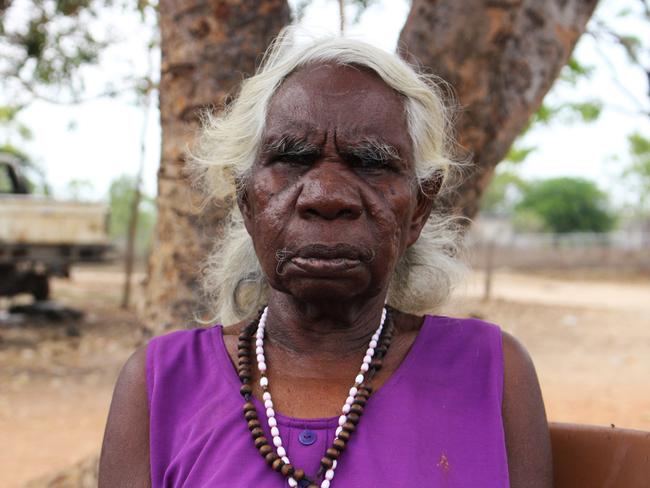
“I was here maybe a month ago, I stayed at Nunuk (Wilson’s) house, just for a night before the art fair, and I was staying with Karl, her husband, and the house just got attacked,” she says.
“Karl turned off all the lights, they started throwing rocks at the house, I called the police, they were doing like big doughnuts, it was so dark you couldn’t tell how close they were and what they were doing but it was really scary.

“We just sat in the darkness the whole night because we were scared.”
When prompted for any insight on what went so badly wrong, Ms Rodski says “I only know what I’ve been told”.
“It’s actually quite murky, I don’t know, something happened between the families and it’s just maybe a grudge but it’s been three years so I don’t know, I’m not sure,” she says.
One of the town’s few other non-Indigenous residents, council worker Michael Toomby, says while he can shed no more light on the conflict, when asked if the Wilsons generally seem to be the victims he says that’s “exactly” how it appears.
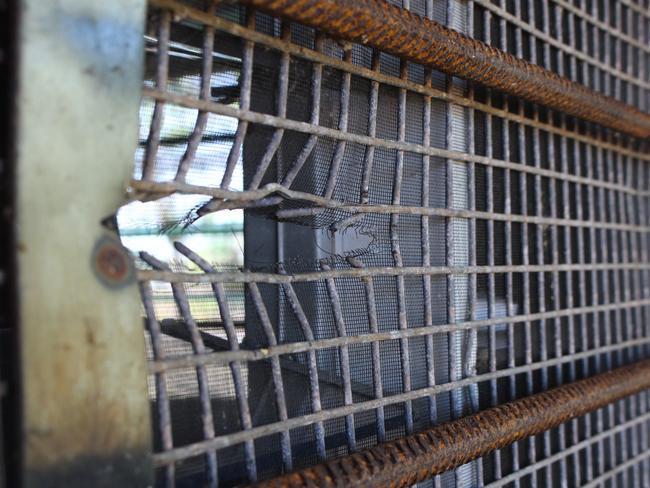
“This is from what I see, not from what I know, (the other families) are all doing all the banging and clanging and then as soon as something goes down, the police are straight down there (to the Wilsons),” he says.
“I work down there, I don’t see them running up here antagonising shit, so that’s foreign to me.”
One thing both warring clans can agree on is that whoever may be at fault, the police response is totally inadequate, but Mr Toomby says while he often has to step in to quell the violence when the cops are unavailable, he can understand their reluctance.
“You can’t really get in the middle of it because (the police) keep getting assaulted and there’s only two of them (here) half the time, I don’t want to bag people who have got to go home to feed their families,” he says.
“Sometimes things aren’t always what they seem.
“I do my best to stay out of this type of stuff because it’s none of my business.”
NT Police was unable to respond to a request for comment by deadline.

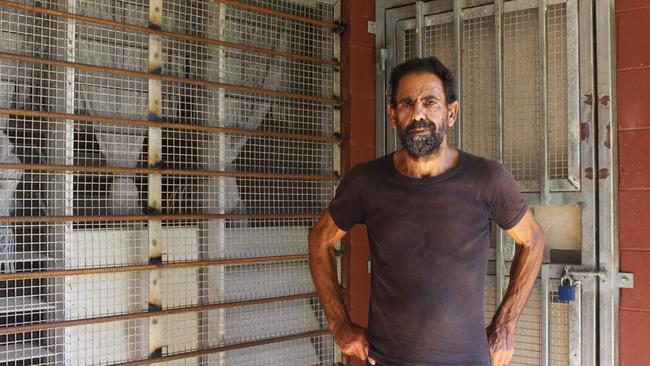
Add your comment to this story
To join the conversation, please log in. Don't have an account? Register
Join the conversation, you are commenting as Logout
Saltbush building foundations to the future for Aboriginal Territorians
Saltbush Social Enterprises has celebrated the power of Aboriginal-led, culturally grounded support programs helping Aboriginal Territorians move from crisis to stability — and from stability to thriving _ at its recent showcase event in Darwin.
The Stem Academy helping young Indigenous women beat the odds
In the NT, the percentage of Indigenous students who stay in school is the lowest in Australia at 33 per cent but the Young Indigenous Women’s Stem Academy is changing that.